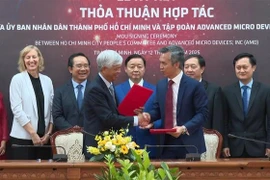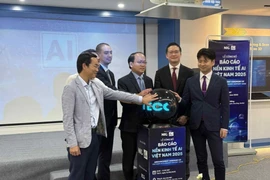Hanoi (VNS/VNA) - The combination of e-commerce and artificial intelligence (AI) will be an important tool to help start-ups optimise sales processes and improve the customer experience.
AI is not just a support tool, but also a key driver in optimising marketing strategies, analysing data and crafting effective advertising campaigns, said Vu Minh Ngoc, a representative of the Centre for E-commerce and Digital Technology (eComDX), at a recent seminar on e-commerce applications for young entrepreneurs.
This is especially crucial for new start-ups, as it helps them scale quickly and stay competitive in the market, he added.
E-commerce is no longer a new trend, but has become an important factor helping businesses develop and integrate into the global digital economy, said Ngoc.
Although there are no exact figures, the number of start-ups in the e-commerce sector in Vietnam is still quite low compared to the strong development potential of the industry, he noted.
The eComDX representative said that promoting and creating a favourable environment for young businesses in this field to develop is extremely necessary.
Only with the right support and sustainable development strategy can e-commerce become one of the important pillars of the digital economy, while contributing to creating a dynamic and healthy competitive market.
Ngoc said he believes that the current booming e-commerce market shows great potential, creating many opportunities for Vietnamese start-ups. Starting a business in the e-commerce sector is also in line with the Government's policy of promoting the development of the digital economy.
The legal framework for e-commerce activities is increasingly complete. Start-ups are encouraged through open policy mechanisms that foster favourable conditions for development and support from the national creative start-up ecosystem, he added.
On the other hand, the country's e-commerce market is still quite new compared to those around the globe, so there is still a lot of room for Vietnamese start-ups, Ngoc said.
Cao Qui Long, another eComDX representative, said that to maximise the power of AI tools, new start-ups need to have a clear and specific strategy for each work goal.
Whether it's building a brand, promoting products or improving the customer experience, AI tools can effectively support the optimisation of processes and creation of added value for businesses, said Long.
In e-commerce in particular, AI could help businesses automate many stages, from analysing market data or classifying customers to personalising marketing campaigns, he added.
Currently, platforms such as Shopee, Lazada or TikTok Shop provide start-ups with available AI tools, supporting the optimisation of products, prices and advertising campaigns, thereby improving competitiveness in the market.
Long also said that testing and adjusting the results given by AI is very important to ensure the highest efficiency.
AI tools cannot replace humans, but if used properly, they will open up unprecedented opportunities, he added.
"The ability of young entrepreneurs to grasp and apply AI tools effectively will determine their success in the digital economy," he emphasised.
Infrastructure issues such as payment systems, warehousing, transportation, packaging and customs procedures are still major obstacles that start-ups have to face, said Nguyen Huu Hung, deputy director of the Department of Industry and Trade of Quang Tri province.
However, the biggest challenge for start-ups is the lack of creative thinking and the ability to find differences, he said.
Success depends not only on product quality, but also on creativity in designing sales applications, advertising campaigns, marketing and customer care, emphasised Hung./.

See more

5G technology expansion expected to boost Vietnam’s digital economy
The Ministry of Science and Technology reported that by 2025, 5G had been commercialised nationwide, covering more than 90% of the population. Viettel alone has deployed 30,000 5G base stations, achieving 90% outdoor coverage and 70% indoor coverage, exceeding its commitments to the Government.

Law opens new development spaces for Vietnam’s technology firms
First enacted in 2008, the Law on High Technology laid the foundation for the establishment of high-tech parks, the attraction of investment into key technological fields, and the promotion of research and development (R&D).
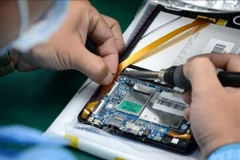
Centre established to support semiconductor chip pilot production
The centre will provide essential infrastructure and public services to support semiconductor design and prototyping as part of Vietnam’s broader industrial strategy.

HCM City pilots UAVs for delivery services
HCM City aims to promote UAV use in urban delivery - a promising field contributing to smart logistics and postal services for e-commerce, smart cities and high-tech public services, while fostering UAVs as a strategic technology sector underpinning the innovation ecosystem.

Viettel’s virtual assistant among Top 10 technology products
The accolade recognises the mastery of core technologies by the Viettel Artificial Intelligence and Data Services Centre (Viettel AI), while reaffirming the group’s capacity to successfully deploy “Make in Vietnam” artificial intelligence solutions in international markets.

Innovation – Driver for new development phase
The draft action programme of the Party Central Committee to implement the Resolution of the 14th National Party Congress identifies the shift to a new growth model, economic restructuring, and accelerated industrialisation and modernisation, with science, technology, innovation and digital transformation as the core engines, as key tasks.

Effective implementation of Resolution 57 lays firm foundation for new development phase
The resolution has affirmed that in the digital era, science, technology and digital transformation are no longer optional but mandatory conditions, while innovation has evolved from a research activity into a core driver of national growth.

Objectives of Vietnam’s sci-tech, innovation strategy reachable: Israeli expert
Vietnam is aiming to become a high-tech economy with the STI pillars identified as the enablers, and the local conditions enable their rapid development, said an Israeli expert.

Hanoi to host 6th ASEAN Digital Ministers’ Meeting in January
Held annually on a rotating basis among ASEAN member states, the meeting plays a key role in shaping strategic orientations, formulating policies and promoting digital cooperation within ASEAN, while strengthening collaboration with partners and international organisations amid rapid digital and digital-economy transformation globally.

Viettel records breakthrough in first 5G Advanced trial
The achievement, marked as Vietnam’s first 5G Advanced trial, was made possible by carrier aggregation (CA) technology, enabling mobile devices to operate across multiple frequency bands simultaneously instead of a single band.

National Data Centre No.1 to help accelerate digital transformation: Party chief
The National Data Centre No.1 has been positioned as a core and pivotal facility, serving as the “brain” and “heart” of the national digital transformation process, said Party General Secretary To Lam.

FPT, GELEX partner up to advance blockchain technology
The cooperation framework is designed to be flexible, aligning with the capabilities and development orientations of both companies as well as legal regulations in different countries and territories.

Resolution 57: Role of intellectuals in advancing science and technology research
Prof. Dr. Tran Dai Lam, Director of the Institute of Materials Science at the Vietnam Academy of Science and Technology (VAST), emphasised that intellectuals should nurture national responsibility and ambition, be ready to take on challenges, evaluate research outcomes by international standards, and engage in collaboration across different sectors.
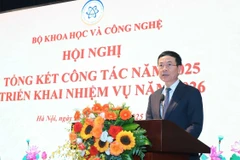
Science, technology, innovation elevated as pillars for development: official
2025 represents a shift in development mindset, with the science and technology sector tasked to turn concepts into tangible capabilities, concrete results, and measurable value for the country.

Resolution 57 - catalyst for scientific and technological breakthroughs
The resolution also seeks to create stronger mechanisms to mobilise social and private resources and support an innovation ecosystem; link digital transformation in the public sector with the modernisation of national governance; and prioritise the development of elite human resources and internationally-standard research infrastructure.

Science, technology drive Vietnam’s rising global profile: expert
Assoc. Prof. Le Duc Anh from Tokyo University held that for fast and sustainable development, Vietnam should prioritise science – technology and innovation as the main driver of productivity, focusing on sectors with high spillover effects such as semiconductors, AI, data, new energy and materials, biomedical technology, automation – robotics, and cybersecurity.

OV intellectuals help boost Vietnam’s edge in global race: Official
Once properly harnessed, intellectal and sci-tech resources of the OV community can both help narrow development gaps and serve as a strategic advantage for enhancing Vietnam’s competitiveness and global engagement in the new era.
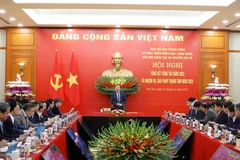
Party chief outlines guidance for science, technology, digital transformation development for 2026
General Secretary Lam emphasised the need to develop concrete applications and products serving socio-economic development and people’s needs, with public and business satisfaction as the ultimate measure. Digital transformation must be closely linked with administrative reforms, organisational streamlining and the effective operation of the two-tier local administration model.
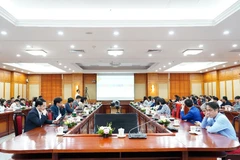
National portal expected to transform innovation into reality
The portal, which can be accessed at sangkien.gov.vn, was built to address the urgent need to mobilise collective intelligence and unlock the creativity of the entire population, in accordance with the directives of the steering committee for the implementation of the Politburo’s Resolution No. 57-NQ/TW on creating breakthroughs in science, technology, innovation and national digital transformation.

Digital tech contributes over 1 trillion VND to economy: conference
The digital technology sector has contributed more than 1.075 trillion VND (41 billion USD) to GDP, an increase of 10% year-on-year, with estimated profits of over 371 billion VND, reflecting strong operational efficiency.
